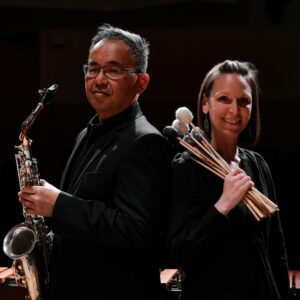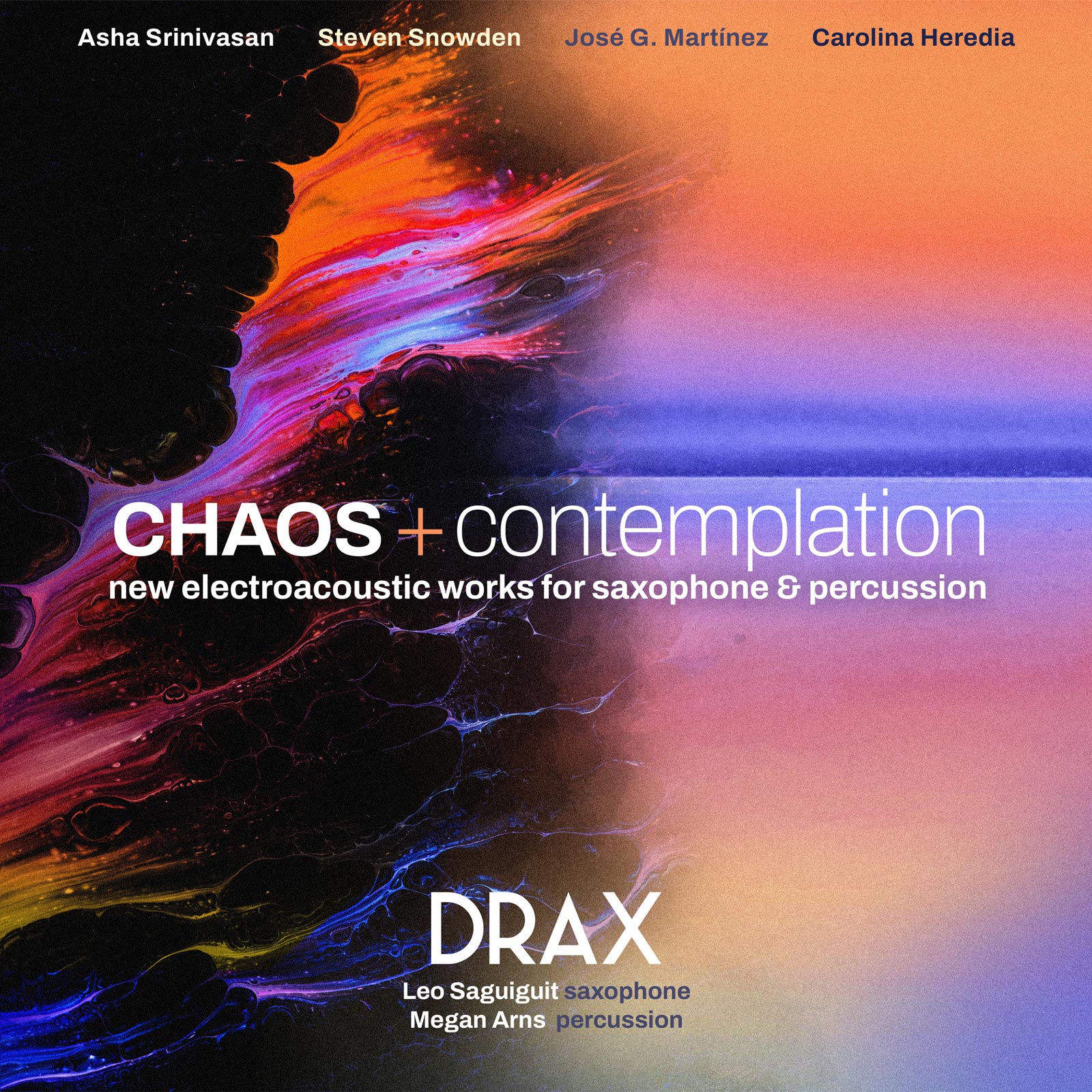CHAOS + contemplation
DRAX
Leo Saguiguit saxophone
Megan Arns percussion
Asha Srinivasan composer
Steven Snowden composer
José G. Martínez composer
Carolina Heredia composer
There are a number of established, conservative duo setups in Western music; but DRAX isn’t one of them, and doesn’t want to be. The saxophone-percussion duo, consisting of saxophonist Leo Saguiguit and percussionist Megan Arns, may be firmly rooted in contemporary American academia, but their music is one thing first and foremost: positively rebellious.
Having intentionally commissioned a diverse range of composers in terms of style, ethnicity and gender, DRAX ambitiously attempts to scrutinize and reflect upon current social issues on CHAOS + CONTEMPLATION. Political turmoil, mass hysteria and the impact of ubiquitous technology are among the motifs presented, and this struggle is impressively manifest and tangible in the music – energetic, unapologetic and raw.
Listen
Stream/Buy
Choose your platform
Track Listing & Credits
| # | Title | Composer | Performer | |
|---|---|---|---|---|
| 01 | Tantrums | Asha Srinivasan | DRAX | Leo Saguiguit, saxophone; Megan Arns, percussion | 12:31 |
| 02 | We Don’t Have Enough Time | Steven Snowden | DRAX | Leo Saguiguit, saxophone; Megan Arns, percussion | 4:10 |
| 03 | Where Are Our Mothers | Steven Snowden | DRAX | Leo Saguiguit, saxophone; Megan Arns, percussion | 5:02 |
| 04 | They Tried to Bury Us, They Didn’t Know We Were Seeds | José G. Martínez | DRAX | Leo Saguiguit, saxophone; Megan Arns, percussion | 10:41 |
| 05 | Soledad, Part I: Lamenting | Carolina Heredia | DRAX | Leo Saguiguit, saxophone; Megan Arns, percussion | 2:41 |
| 06 | Soledad, Part II: Triumphant | Carolina Heredia | DRAX | Leo Saguiguit, saxophone; Megan Arns, percussion | 4:27 |
Photography by Nicholas Wu
Financial Assistance
Mizzou New Music Initiative, Sinquefield Charitable Foundation
University of Missouri Research Council
Richard Wallace Faculty Incentive Grant
Recorded voices on They Tried to Bury Us, They Didn’t Know We Were Seeds (Track 4): Sifa Bihomora, Adriana Boersner-Herrera, Brandon Boyd, Darneisha “Neisha Nicki” Coleman, Rachel Czech, Eloi Español, Varvara Fomina, Ernest Harrison, Christian Hoyos, Ekaterina Shevchenko
Recorded September 19, October 24, November 7&14, 2020 at Sinquefield Music Center Recording Studio, University of Missouri, Columbia MO
Recording Session Producer Connor Stevens
Recording Session Engineer David Myers
Editing & Mixing Rob Boullion, LinderVox Sound
Production Assistants Nate Beattie, Jeremiah Ingram, Stephen Landy, Emily Miclon, Jordan Nielsen, Daniel Vega
Electronic Production & Mixing Asha Srinivasan, Steven Snowden, José G. Martínez, Carolina Heredia
Mastering Melanie Montgomery
Executive Producer Bob Lord
A&R Director Brandon MacNeil
A&R Danielle Sullivan
VP of Production Jan Košulič
Audio Director Lucas Paquette
VP, Design & Marketing Brett Picknell
Art Director Ryan Harrison
Design Edward A. Fleming, Morgan Hauber
Publicity Patrick Niland, Aidan Curran
Artist Information

DRAX
Formed in 2014, DRAX is a faculty ensemble-in-residence at the University of Missouri School of Music with Leo Saguiguit (saxophone) and Megan Arns (percussion). Dedicated to performing and creating new repertoire for this unique combination of instruments, the duo made its international debut at the World Saxophone Congress in Strasbourg, France. DRAX has performed at the Mizzou International Composers Festival, the Percussive Arts Society International Convention, conferences of the North American Saxophone Alliance, Odyssey Chamber Music Series of Columbia, Mareck Center for Dance, and residencies at universities including Virginia Tech University, Sam Houston State University, Colorado State University, and the Eastman School of Music.
Notes
Chaos + Contemplation is the culmination of a commissioning and recording project to create new works that combine multimedia with saxophone/percussion duo. DRAX commissioned four composers, all of whom were past resident composers of the Mizzou International Composers Festival, a program of the Mizzou New Music Initiative. The following compositions provide an array of artistic perspectives and sonic possibilities yet are similar in that they express artistic commentary to contemporary events. Through their work, these composers grapple with the implications of the 2016 United States presidential election, police brutality, racial injustice, hostility, isolation, reconciliation, and the need to heal. The duo elaborates:
We wanted our project to reflect the voices of a diverse group of composers in their aesthetic approaches, as well as their different perspectives with respect to gender and ethnicity. Other than a time limit, composers were given free reign with their choice of instrumentation, multimedia element, and thematic subject. What resulted was a remarkable collection of works that comment on — both directly and indirectly — the emotional rollercoaster of the continuing tumultuous political and social landscape of the last several years. We also hear from the different perspectives of composers living in America, from the born-and-raised, to the first-generation citizen, and to recent transplants from abroad. The music challenges the listener while also unleashing the unlimited soundscape of the saxophone/percussion duo with electronic music.
– Program Notes by Megan Murph, Ph.D.
Dr. Megan Murph is Visiting Assistant Professor of Music at the University of Missouri and serves as the Director of the Budds Center for American Music Studies. She currently serves as co-chair of the American Musicological Society’s Ecocriticism Study Group and the Society for American Music’s Experimental Music Interest Group.

